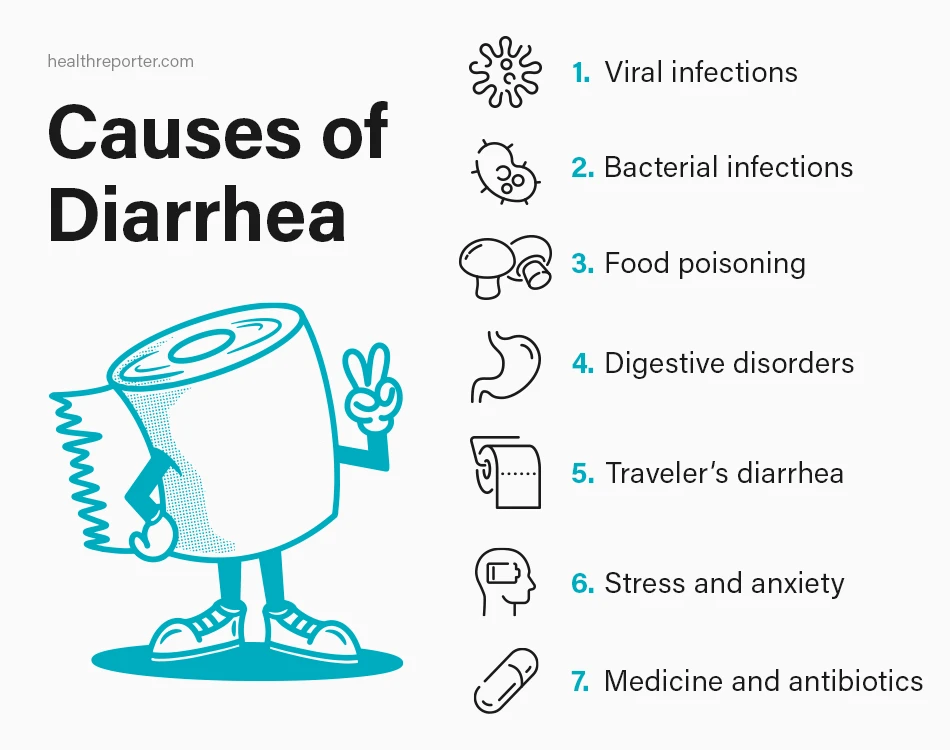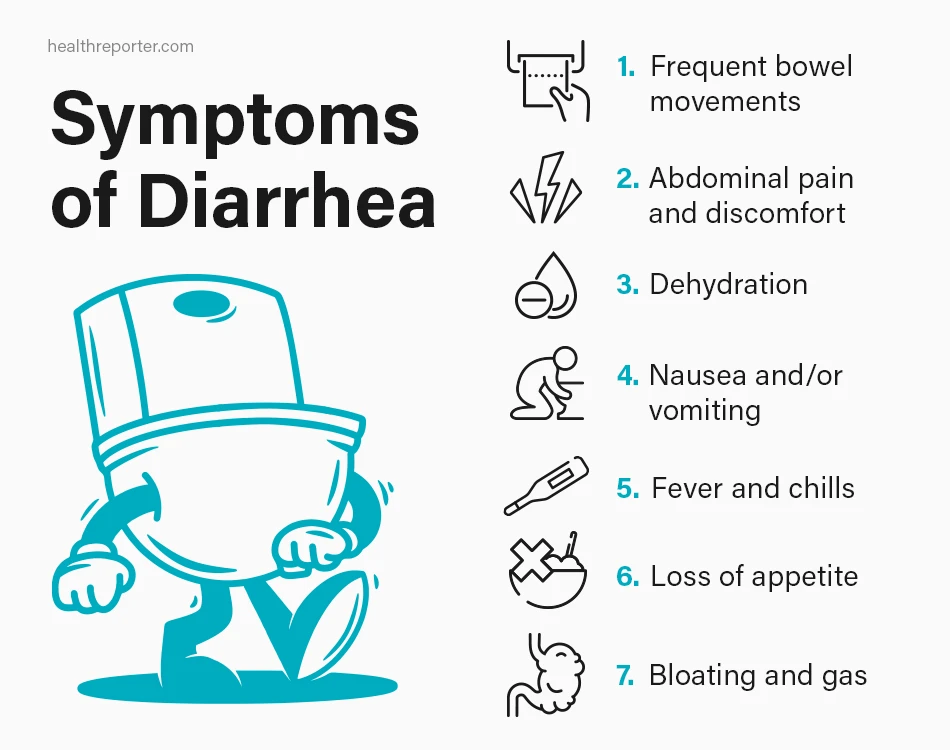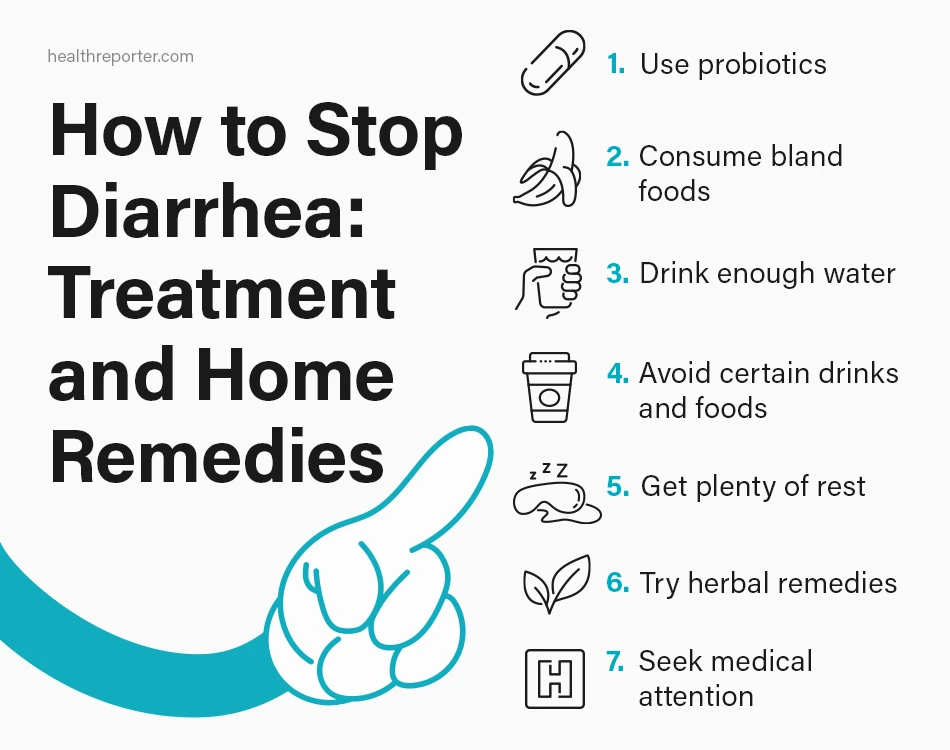Diarrhea 101: Causes, Treatment Options, and Prevention Strategies
Find out what to do when diarrhea strikes and how you can prevent it from causing you more pain.

Having to rush to the bathroom every 5 minutes with diarrhea is not only inconvenient but can also leave you feeling stressed, embarrassed, and in pain.
Whether this is a rare occurrence or you experience diarrhea frequently, it’s important to know how to manage and treat the symptoms before they develop into serious health complications.
Read on to learn more about the causes of diarrhea, the signs you should be aware of, and what you can do to make yourself or your loved one more comfortable.
What Is Diarrhea?
If your stools are watery or loose, and you find yourself going to the bathroom more often than usual, then you have diarrhea. You may experience diarrhea on its own or with other symptoms like abdominal pain, fever, nausea, and vomiting.
Diarrhea typically only lasts a few days and goes away naturally for most people. However, if the condition persists, this can indicate an underlying problem, such as irritable bowel syndrome (IBS), inflammatory bowel disease (IBD), or celiac disease.
Causes of Diarrhea
Unfortunately, there is a wide range of diarrhea causes, from bacterial infections to certain medications. Read on to find out what these are:

#1 Viral infections
A number of viruses can lead to diarrhea, such as the highly contagious norovirus, which is often known as the stomach bug. Other viral infections that trigger diarrhea include enteric adenoviruses, astrovirus, and rotavirus, all of which are common causes of gastroenteritis in children.
You may also encounter diarrhea if you contract infections like viral hepatitis or COVID-19.
#2 Bacterial infections
You may be exposed to diarrhea-causing bacteria if you consume contaminated food and water that contains parasites or E.coli.
This can be identified by taking a stool sample, which your doctor will then send to a lab. The results will show whether there are any abnormal bacteria present in your digestive tract that is causing you to feel unwell.
#3 Food poisoning
Food poisoning develops after eating something contaminated by bacteria such as salmonella or E.coli. This usually happens if food hasn’t been cooked or reheated properly, is left out for too long, has been stored incorrectly, or is eaten after its use-by date.
The symptoms can range from mild to serious and include diarrhea, high fever, vomiting, stomach cramps, and dehydration.
#4 Digestive disorders
Diarrhea can also occur if you have a food intolerance, which is when your body has trouble digesting certain types of food.
For example, lactose, the sugar found in milk and other dairy products, is a common intolerance. Many people also have trouble digesting fructose, a sugar found naturally in fruits or as a sweetener added to beverages.
Food allergies such as celiac disease and other digestive disorders, including inflammatory bowel disease (IBD), irritable bowel syndrome (IBS), Crohn’s disease, ulcerative colitis, and small intestinal bacterial overgrowth (SIBO) are other common causes of diarrhea.
To diagnose any of these disorders, medical professionals can conduct fasting tests. They show whether there are foods that you are intolerant to or if the diarrhea is caused by an immune system reaction to particular foods. Blood tests also highlight low vitamin levels, which can help to indicate poor absorption or celiac disease.
#5 Traveler’s diarrhea
In countries with different sanitary conditions and food or water quality standards, travelers’ diarrhea is a common digestive disorder. The infection is typically caused by consuming contaminated food or water, often due to bacterial, viral, or parasitic infections.
There are a number of symptoms of traveler’s diarrhea, including frequent watery stools, abdominal cramps, bloating, nausea, and sometimes a fever. Symptoms can appear suddenly and disrupt daily activities, potentially compromising travel plans.
Good hygiene is crucial for preventing traveler’s diarrhea, including hand washing regularly, avoiding raw or undercooked foods, tap water, and unpeeled fruits and vegetables. The risk of infection can also be reduced by drinking bottled or boiled water and consuming only hot, well-cooked meals.
It is crucial to stay hydrated if traveler’s diarrhea occurs. The symptoms of this illness may be alleviated with oral rehydration solutions and over-the-counter medications, such as antidiarrheal drugs and antibiotics prescribed by your doctor.
#6 Stress and anxiety
You may experience diarrhea when stressed or anxious because of your body’s “fight-or-flight” reaction to stress. To protect you against perceived threats, your nervous system responds with a variety of physical changes, including a higher heart rate and blood pressure.
Digestion also slows down to allow the body to redirect resources elsewhere. While the activity of the gut and small intestine slows, the colon’s activity increases, which can lead to diarrhea.
#7 Medicine and antibiotics
Medication-induced diarrhea, or antibiotic-associated diarrhea, is a common side effect that occurs when certain medications disrupt the normal balance of bacteria in the digestive tract.
Taking antibiotics or certain other medications can negatively affect not only harmful bacteria in your gut but also beneficial bacteria. As a result, harmful bacteria, such as Clostridium difficile (C. diff), can overgrow, resulting in diarrhea.
A person suffering from medication-induced diarrhea may experience frequent loose or watery stools, abdominal cramps, bloating, and sometimes fever. The onset of symptoms can vary according to the medication and individual factors.
Following your healthcare provider’s directions regarding medication dosage and duration is essential for managing and preventing diarrhea caused by medications. Consult your healthcare provider before stopping or altering your prescribed medication.
Symptoms of Diarrhea
The symptoms of diarrhea vary from person to person, depending on the cause and type that they have. However, along with loose, watery stools, here are some of the most common ones associated with this problem:

Frequent bowel movements
According to the World Health Organization, diarrhea can be defined as having 3 or more loose, watery stools per day.
This is because when you have diarrhea, the digestive process speeds up, meaning that the large intestine doesn’t have enough time to absorb any excess fluid. The fluid instead comes out in your stool.
Abdominal pain and discomfort
Pain in the area between your chest and pelvis often accompanies diarrhea and is typically caused by inflammation in the digestive tract. This leads to problems with your usual digestive processes, which may be because of norovirus, indigestion, or food poisoning.
Dehydration
It’s important to seek medical attention if you become dehydrated through diarrhea, as it can quickly become a life-threatening condition when left untreated. This is the case especially for young children, older adults, and people with weakened immune systems, such as those going through cancer treatment.
The most common signs of dehydration with diarrhea are dark-colored urine, dry mouth and skin, excessive thirst, fatigue, and dizziness or lightheadedness.
Nausea and/or vomiting
Diarrhea and vomiting are symptoms that often go hand-in-hand and usually indicate that you have gastroenteritis. This is where your stomach and intestines become irritated or inflamed, and can quickly lead to dehydration.
Fever and chills
Having a fever alongside diarrhea suggests that your body is fighting an infection, such as norovirus. You may feel sweaty, have chills, and feel an ache all over your body.
Loss of appetite
While you’re experiencing diarrhea and stomach upset, it’s unlikely that you’ll want to eat. This can lead to dehydration and weight loss over a long period, so try to eat small portions of bland foods to keep up your energy.
Bloating and gas
Bloating occurs when your belly feels tight and full, which is usually due to gas. If you have a condition such as IBS, your stomach is more sensitive to gas, which leads to pain, more bloating, and diarrhea.
Types of Diarrhea
Diarrhea usually lasts only 1–2 days, but if it persists for longer, then this may be an indication of an underlying problem. The 3 main types are:
#1 Acute diarrhea
Acute diarrhea occurs when loose or watery stools appear suddenly and last only for a few days. Food poisoning, viral or bacterial infections, or contamination of food or water are common causes.
Dehydration, abdominal cramps, and nausea are possible symptoms. Usually, acute diarrhea resolves on its own after resting, drinking a lot of water, and taking over-the-counter medications.
If symptoms worsen or persist, medical attention may be needed.
#2 Persistent diarrhea
Diarrhea that lasts longer than 2 weeks is considered persistent diarrhea.
Consistent diarrhea can be caused by bacterial, viral, or parasitic infections. There are also chronic diseases that can cause recurring episodes of diarrhea, such as inflammatory bowel disease (IBD), celiac disease, or irritable bowel syndrome (IBS).
There are some medications that can cause persistent diarrhea, especially antibiotics or medications that affect the digestive system.
It is crucial to identify the underlying cause before treating it with dietary changes, fluid replacement, medication, or dealing with infections or underlying conditions.
#3 Chronic diarrhea
The term chronic diarrhea refers to the persistent or recurrent occurrence of loose, watery stools over a long period of time, typically for more than 4 weeks.
Different underlying conditions can cause it, such as inflammatory bowel disease, irritable bowel syndrome, celiac disease, infection, or malabsorption disorders. Other symptoms of chronic diarrhea include abdominal pain, weight loss, and fatigue.
An evaluation by a medical professional is often necessary to determine the underlying cause and appropriate treatment, which may involve medication, dietary changes, or lifestyle changes.
How to Stop Diarrhea: Treatment and Home Remedies
Although diarrhea usually goes away on its own, there are some things that you can do to make yourself feel more comfortable in the meantime. Try out some of the following diarrhea remedies:

#1 Use probiotics
Probiotics are a type of “good” bacteria that occur naturally in the body. They can be useful in tackling diarrhea caused by C. diff or antibiotics as they eliminate “bad” bacteria, therefore helping to restore a healthy bacterial balance within the gut.
You can find probiotics in a number of foods and drinks, including kombucha, kefir, yogurt, sauerkraut, tempeh, and even dark chocolate. Probiotic supplements are also a convenient way of restoring good gut health.
#2 Consume bland foods
Eating non-seasoned, mild, and bland foods prevents your stomach from becoming more irritated, which can help diarrhea go away faster. Try following the BRAT diet, which encourages you to eat only bananas, white rice, applesauce, and white toast.
As these foods are low in fiber, they won’t aggravate your digestive system and will also help to firm up your stools. Other foods that you can eat include baked potatoes, oatmeal, soda crackers, lettuce, and low-sugar apple juice.
#3 Drink enough water
When you have diarrhea, it can cause you to become dehydrated. This means that you’ll feel thirsty and tired, have a dry mouth, and won’t urinate as often. Some of the more serious effects include being lightheaded or faint, headaches, organ damage, or coma.
To avoid this and rehydrate yourself, it’s important to drink plenty of water.
#4 Avoid certain drinks and foods
If you’ve got diarrhea, it’s important that you don’t consume foods or drinks that will make you feel worse. This includes dairy products, high-fiber foods such as beans and whole grains, or meals that contain lots of spice or seasoning.
You should also try to avoid caffeinated and alcoholic drinks, which can cause further dehydration.
#5 Get plenty of rest
Diarrhea causes you to feel weak and fatigued, particularly if you’ve lost a lot of fluid through dehydration. It’s, therefore, vital to let your body rest and recharge to rebuild your strength, meaning that you may need more sleep than usual.
#6 Try herbal remedies
Herbal remedies, such as peppermint, chamomile tea, and ginger, have been shown to be effective in soothing the digestive system. However, you should always consult a healthcare professional before trying any of these solutions, particularly if you are taking other medications or you have an underlying health condition.
#7 Seek medical attention
If you have persistent or chronic diarrhea, it’s vital that you consult a healthcare provider so that they can rule out any underlying medical conditions.
Doctors can diagnose you and prescribe the correct medication, which will tackle some of the dangerous symptoms of prolonged diarrhea, such as dehydration. They will create a care plan based on your age, medical history, how serious your condition is, and how well you handle particular types of medicine.
Prevention Tips
Although contracting diarrhea can’t always be helped, there are some things that you can do to reduce your risk. This includes developing good personal habits, such as:
Practice good hygiene
Be sure to wash your hands often, particularly after visiting the toilet, when using public transport, after handling uncooked meat, and before eating meals.
You should lather your hands with soap for at least 20 seconds and carry at least 60% alcohol-based sanitizers so that you can clean your hands on the go, too.
Be cautious when eating out
If you’re at a restaurant or eating takeout, it’s important to check that meat and fish are hot and cooked all the way through to at least medium doneness. Particularly when traveling in developing countries, don’t eat raw fruits and vegetables unless you’ve washed and peeled them yourself.
You should also avoid eating from street vendors or food trucks, whose food hygiene levels may not be up to scratch.
Drink safe water
When traveling to another country, you should avoid drinking tap water or using it to brush your teeth. Instead, only drink bottled water, or soda, beer, and wine served in its original container.
Hot coffee and tea are likely to be safe, as they are made with boiled water that kills any bacteria.
Manage stress and anxiety levels
Stress not only has a huge impact on your mental health, but it can also affect your gut health too. Try to implement healthy habits into your daily routine to lower levels of stress and anxiety, including exercising regularly, using journaling apps, practicing mindfulness, and limiting your screen time.
Get the recommended vaccines if you are traveling
If you’re traveling to an area with active cholera transmission, it’s important that you get vaccinated to stop yourself from contracting severe diarrhea. Talk to your doctor, who can recommend the correct vaccines for you.
Be mindful when taking antibiotics
As mentioned previously, antibiotics can kill good bacteria in the intestine, along with the harmful bacteria that are making you feel unwell. Health professionals will, therefore, only prescribe antibiotics when they are truly necessary.
To prevent diarrhea while on this medication, probiotics can be useful, as well as eating bland foods.
Diarrhea in Children and Older Adults
When diarrhea strikes children and the elderly, it can become a lot more serious. Chronic diarrhea quickly leads to dehydration in these age groups, so it’s important to seek medical attention if the condition doesn’t improve in 24 hours.
Some symptoms to look out for in children include:
- Dry mouth and tongue
- Crying without tears
- Sunken eyes, cheeks, or abdomen
- Not having a wet diaper in over 3 hours
- Becoming unresponsive or drowsy
- Irritability
You should also consult a doctor if they have black or bloody stools or a fever above 102℉ (39℃).
When to Seek Medical Attention
Diarrhea usually goes away on its own, but if not, it’s crucial that you get the right treatment. As an adult, you should therefore contact your doctor or healthcare provider when:
- Symptoms of dehydration begin to occur, such as thirst, fatigue, or dizziness.
- You are getting bouts of diarrhea more often
- The amount of diarrhea you’re having is greater
- You also have rectal bleeding or black stools
- You have a fever above 102℉ (39℃)
- You’re experiencing severe rectal or abdominal pain
FAQs
Acute diarrhea should go away after 1–2 days. However, if it lasts for weeks, you should consult a doctor.
Be sure to consume plenty of fluids. If you’re struggling to keep fluids down, sip on small amounts of water frequently, or try sucking on ice. You may also need to drink oral rehydration solutions, which help to replace the essential electrolytes and lost fluids.
Yes, acute diarrhea is normal, but if it lasts for longer, you should seek medical help as soon as possible.
Having watery diarrhea suggests that you have an infection in the intestines. However, it can also be a sign of chronic conditions, including irritable bowel syndrome or inflammatory bowel disease.
A Word From an MD


Diarrhea is a common condition that has a range of different causes, from food poisoning and stomach bugs to stress and more serious digestive disorders.
For most people, diarrhea isn’t a major concern and goes away on its own. However, for children, the elderly, and those with medical conditions that weaken the immune system, it can be more serious. These populations are at risk of complications such as dehydration, organ damage, and kidney failure.
To reduce your risk of contracting diarrhea, remember to wash your hands frequently when out or before preparing food, and only drink bottled water while traveling. Taking probiotics can also restore good gut health and help with bloating, which often accompanies diarrhea.
Conclusion
Diarrhea is an uncomfortable yet highly treatable condition that causes you to have loose, watery stools. You may also need to go to the toilet more frequently than usual while experiencing symptoms such as stomach cramps, nausea, and bloating.
If you’re unsure how to treat diarrhea, have had it for a prolonged period, or your symptoms are getting worse, then you should consult a healthcare professional. It’s also vital to speak to your doctor if a child or older adult contracts severe diarrhea, as they are at risk of health complications from dehydration.

















































 Select your language:
Select your language: 








